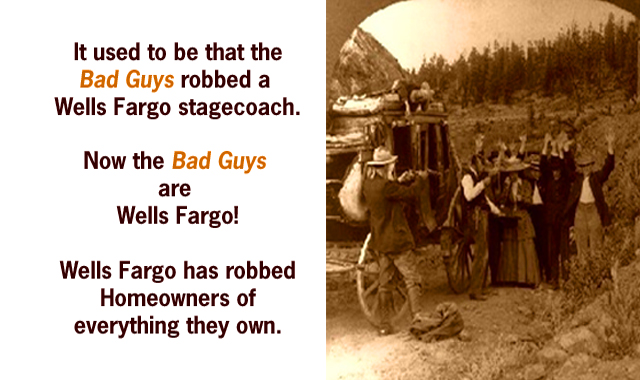725,000 judgment against Wells Fargo for Misapplying $2,212 Mortgage Payment
Below is a story of an attorney that has been battling the banks on behalf of many Northern Nevada homeowners for several years. His first experience with the banksters’ egregious conduct towards borrowers began in September 2004 and resulted in a $725K judgment against Wells Fargo Bank. The judgment was entered in April 2009 and is currently being appealed for the second time.
After almost 3 years of litigation, an internal electronic office memorandum dated on or about May 2005 contained an admission from Wells Fargo that it had mistakenly applied the mortgage payment to the wrong account and that it should correct its error. However, Wells Fargo refused to correct its admitted error and has began a campaign trying to wear down and outlast his client. A campaign that began in September 2004 when it first misapplied his client’s mortgage payment (”$2200″). The action was filed in the federal district Court of Northern Nevada in May 2005 and was finally agreed to submit the matter to binding arbitration in January 2009.
An arbitration award was issued in February 2009 and I moved for an award of attorney’s fees and costs in the amount of about $500,000. In Wells Fargo’s opposition to the fee application, it admitted that “plaintiff’s fees and costs pale in comparison to the fees it paid.” Regardless the arbitrator award all of my client’s fees and costs. Wells Fargo then moved to have the arb award vacated pursuant to the Federal Arbitration Act in the district court. The district court refused to rule on its motion because the parties’ stipulation to proceed to binding arbitration was with the understanding that the losing party would appeal the award directly to the 9th Circuit.
In August 2009, Wells Fargo appealed the arbitration award. In February, 2011, the 9th Circuit remanded the motion back to the district court with instructions to rule on the motion. On August 17, 2011, the district court issued its memorandum of decision and order denying Wells Fargo’s motion. And, despite the standard for vacating an arbitration award being next to impossible to meet, Wells Fargo filed another appeal to the 9th Circuit on or about September 10, 2011.
The following is a summary of the attached award and findings of fact by the arbitrator, retired California Appellate Court Justice Michael Nott.
This dispute arose out of Wells Fargo inadvertently applying Johnson’s $2,212.00 September 2004 mortgage payment to the wrong mortgage account. Despite Wells Fargo having discovered and admitting its mistake on or about May 2005, Wells Fargo refuses to this very day, October 11, 2011 (over 7 years later), to remedy its admitted wrong doing and continues to employ 2 expensive law firms to employ expensive delaying tactics to postpone the inevitable payment of the arbitration award.
Retired California Appellate Court Justice Michael Nott after 3 1/2 days of trial and reviewing all the evidence and testimony presented by the Parties concluded that despite Wells Fargo having eventually admitted that it had been wrong all along, Wells Fargo refused to correct its error. In an overview of all the evidence presented, he concluded that this matter should have never taken so long to resolve. It just wasn’t complicated and, more poignantly, the evidence is overwhelming that Johnson provided sufficient documentary proof to back his assertion from Day 1 that all appropriate payments had been made to Loans 55 and 56. Id. In his final analysis, Justice Nott concluded that there wasn’t any reason to rush to reporting any negative comments to the CRAs (after the first report) until the problem was finally resolved. Justice Nott noted that Wells Fargo was servicing 8 of Johnson’s other mortgage loans and did not have to report any of them delinquent.
Justice Nott’s ultimate conclusion was that on the face of the documents presented at trial by Johnson, the investigation by Wells Fargo was inadequate, unreasonable, and untimely under the rules of the FCRA. Further, the yoyo reporting and clearing of late payments from October through May, and the continued foreclosure proceedings on Loan 56 were unnecessary and improper.
Johnson was awarded $260,910 including the attorney’s fees and costs he incurred from September 2004 through the end of the arbitration on or about February 2009. Almost 4 1/2 years of litigation that included, but not limited to, trips to California, North Carolina, and Iowa. Attorney fees awarded were $427,739, and cost in the amount of $37,069.
4closureFraud.orgJudgment and Order Re Arb Award
Wells Fargo WJ Opinion
Order Motion Vacate


No comments:
Post a Comment